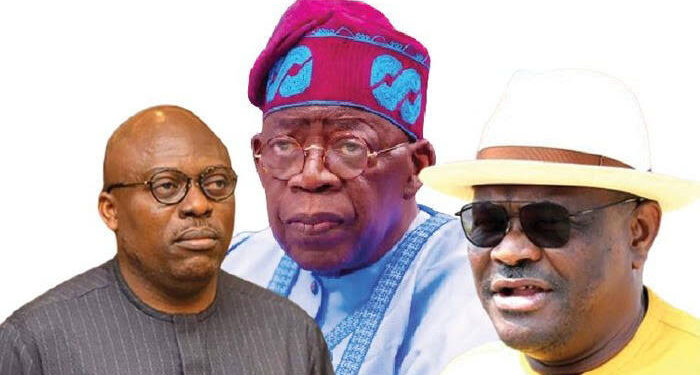President Bola Tinubu on Tuesday evening declared a state of emergency in Rivers State in a nationwide broadcast, citing the need to restore law and order. As part of the declaration, Governor Siminalayi Fubara, his deputy, Mrs. Ngozi Odu, and all elected members of the Rivers State House of Assembly have been suspended for an initial six-month period.
Tinubu also announced the nomination of retired Vice Admiral Ibokette Ibas as the Rivers State administrator to oversee the affairs of the state. Shortly after the declaration, soldiers took control of the Rivers Government House in Port Harcourt.
Military Presence at Government House
An insider confirmed that the governor was still in his official residence when the troops arrived at the premises around 9 pm. A source noted, “As I speak to you now, there are soldiers inside the Government House, but the governor is in his residence.”
An Armoured Personnel Carrier (APC) was stationed at the entrance of the Government House, while several Sports Utility Vehicles with full headlights on were seen outside the main gate. The governor’s status remained uncertain, with no clear indication of his movements.
Tension Across Rivers State
The emergency declaration sparked widespread concern, with many residents of Port Harcourt rushing home after hearing the news. Across the city, people gathered in small groups, discussing the situation. Some residents expressed dismay, attributing the crisis to political actors in the state.
Tinubu Justifies the Emergency Declaration
In his broadcast, President Tinubu expressed concern over the political instability in Rivers State, stating that previous efforts to resolve the crisis had failed.
“Having soberly reflected on and evaluated the political situation in Rivers State, and with the governor and deputy governor failing to request my intervention as required by Section 305(5) of the 1999 Constitution, it has become inevitably compelling for me to invoke Section 305 of the Constitution to declare a state of emergency in Rivers State,” Tinubu stated.
He clarified that the judicial arm of government in the state would continue to function independently and that the administrator would not enact new laws but could formulate necessary regulations subject to Federal Executive Council approval.
The President emphasized that the declaration had been published in the Federal Gazette and forwarded to the National Assembly for ratification. He expressed hope that the intervention would restore peace and order in the state.
Explosions and Security Threats
The emergency declaration followed explosions at two oil pipelines in Rivers State between late Monday and Tuesday. The first blast occurred at the Trans Niger Pipeline in Bodo Community, Gokana Local Government Area, while another explosion was reported at a pipeline manifold in Ogba-Egbema-Ndoni Local Government Area.
The Rivers State Police Command confirmed the incidents and the arrest of two suspects. Police spokesperson Grace Iringe-Koko said the authorities had contacted Shell, which shut down the affected pipeline to prevent further damage.
Governor Fubara Calls for Calm
Reacting to his suspension, Governor Fubara released a statement urging the people of Rivers State to remain peaceful and law-abiding.
“We will engage with all relevant institutions to ensure that our democracy remains strong and that Rivers State continues to thrive,” Fubara stated. He accused lawmakers loyal to the Federal Capital Territory Minister, Nyesom Wike, of frustrating his administration’s efforts to comply with Supreme Court rulings.
Political Crisis Deepens
The political turmoil in Rivers State has been ongoing, with a long-standing rift between Governor Fubara and 27 lawmakers loyal to Wike. Tensions escalated after the Rivers House of Assembly building was bombed in October 2023, leading to its demolition. The governor subsequently presented the 2024 budget before four legislators loyal to him, a move the courts later declared unconstitutional.
The Supreme Court recently ruled that the 27 lawmakers remained valid members of the People’s Democratic Party (PDP), invalidating previous claims of their defection to the All Progressives Congress (APC). The court also ordered the Central Bank of Nigeria (CBN) and the Accountant General of the Federation to stop disbursing funds to Rivers State until a lawful appropriation bill was passed by the Amaewhule-led Assembly.
Impeachment Moves and National Reactions
On Monday, the Rivers State House of Assembly, led by Speaker Martin Amaewhule, served Governor Fubara and his deputy with a notice of gross misconduct, signaling an imminent impeachment process. The development sparked protests by Ijaw groups, who warned against any attempt to remove the governor.
Reacting to the unfolding situation, Tinubu cited threats by militant groups to attack oil facilities and accused Fubara of failing to address the security challenges.
“No responsible President will stand by and allow the grave situation to continue without taking remedial steps prescribed by the Constitution,” Tinubu asserted.
Legal and Political Backlash
The Nigerian Bar Association (NBA) criticized the suspension of democratic structures in Rivers State, arguing that the 1999 Constitution does not empower the President to remove an elected governor under the guise of a state of emergency.
NBA President, Mazi Afam Osigwe (SAN), stated, “A declaration of emergency does not automatically dissolve or suspend elected state governments. Such actions amount to an unconstitutional usurpation of power and a fundamental breach of Nigeria’s federal structure.”
Similarly, former Vice President Atiku Abubakar condemned Tinubu’s decision, calling it a dangerous precedent and an assault on democracy.
The Peoples Democratic Party (PDP) also rejected the state of emergency, describing it as an unconstitutional move to forcefully take over Rivers State. PDP National Publicity Secretary, Debo Ologunagba, stated that Tinubu’s actions amounted to “state capture.”
What Next for Rivers State?
With the National Assembly set to deliberate on the emergency declaration, the future of Rivers State remains uncertain. The crisis has raised concerns about Nigeria’s democratic stability, with legal and political battles likely to unfold in the coming days.
























